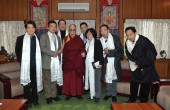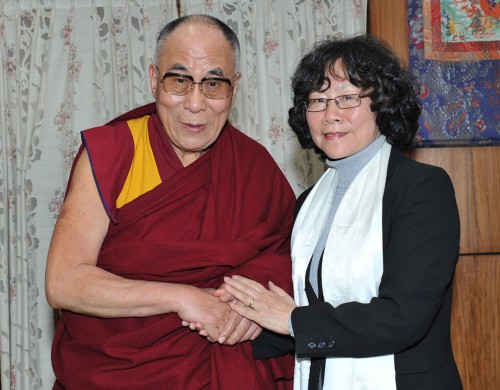Notes from Dharamsala: On Meeting His Holiness, the Dalai Lama
by Tienchi Martin-Liao / March 13, 2013 / No comments
Tibetan settlements in India have fostered strong relations with the government under the Dalai Lama’s teachings. Can they be a guide for Tibetan-Chinese relations?
It was a stormy day in Dharamsala; the monkeys were dangling on the pines and tightrope-walking on the power lines in front of the white bungalow. It was around noon.
We—myself, four Chinese writers, and two Tibetan companions from Europe—stood at the end of the visitor’s line outside of the house, waiting to see the Dalai Lama. A Tibetan couple in front of us was so exited, the woman trembled and murmured uncontrollably—it seemed like she could faint at any time.

- During the Cultural Revolution, people were sentenced to death or outright murdered because of one wrong sentence. In China today writers do not lose their lives over their poems or articles; however, they are jailed for years. My friend Liu Xiaobo for example will stay in prison till 2020; even winning the Nobel Peace Prize could not help him. In prison those lucky enough not to be sentenced to hard labor play “blind chess” to kill time AND TO TRAIN THE BRAIN NOT TO RUST. Freedom of expression is still a luxury in China. The firewall is everywhere, yet words can fly above it and so can our thoughts. My column, like the blind chess played by prisoners, is an exercise to keep our brains from rusting and the situation in China from indifference.

- Tienchi Martin-Liao is the president of the Independent Chinese PEN Center. Previously she worked at the Institute for Asian Affairs in Hamburg, Germany, and lectured at the Ruhr-University Bochum from 1985 to 1991. She became head of the Richard-Wilhelm Research Center for Translation in 1991 until she took a job in 2001 as director of the Laogai Research Foundation (LRF) to work on human rights issues. She was at LRF until 2009. Martin-Liao has served as deputy director of the affiliated China Information Center and was responsible for updating the Laogai Handbook and working on the Black Series, autobiographies of Chinese political prisoners and other human rights books. She was elected president of the Independent Chinese PEN Center in October 2009 and has daily contact with online journalists in China.
After the security check, we proceeded into the anteroom. Two monks were preparing the hadas, which would be blessed and given to us by his Holiness.
Then he was standing there, at end of the short hallway: His Holiness the Dalai Lama. He smiled as he placed the hada around my neck and stretched out his warm hands toward me.
The Dalai Lama likes to meet with the Chinese who understand his “middle-way” approach, which is a wise strategy for promoting dialogue and negotiation with the Chinese regime.
But before I discuss this further, perhaps I should back up a little…
When I came to Dharamshala a decade ago it was a poor and isolated mountain village. Now, it seems to be a prosperous little town, filled with blowing horns, twittering birds, and raucous crowds. The narrow streets hardly have enough room to allow two cars to pass—not to mention that the holy cows, homeless dogs, and loaded donkeys are all considered pedestrians, adding to the busy traffic.
Indeed, this place is host to a funny conglomerate: Animals and human beings; Tibetans and Indians; monks, nuns, and tourists; traditional shops and internet cafés. Contradictory things co-exist harmoniously here.
When the Dalai Lama fled to India in 1959, Prime Minister Jawaharlal Nehru told him that India would offer its best school to the Tibetan children. However, the Dalai Lama turned him down. He wanted the Tibetans to have their own school, and his wish has since been fulfilled. Today, there are many Tibetan schools and monasteries scattered across India where children learn Tibetan, English, and even Chinese.
Some Tibetan settlements are located in the North, but most are in the South. Their communities—filled with their own schools, temples, shops, and transportation systems—merge with the surrounding areas. While the Indian government provides the land and some public facilities, it allows the Tibetans to make their own living on the settlements. There is no intervention into their language, culture, or religion.
In New Delhi, there is a settlement populated by 3,000 Tibetan refugees. They build their own houses and temples, and run their businesses successfully. The streets are lined with shops and booths and are filled with customers and tourists. Indian construction workers, merchants, and even beggars mingle throughout the Tibetan areas.
People live peacefully here—quarreling or fighting is seldom. Ethnic conflicts like in Jerusalem or Cyprus do not exist. One of the Tibetans explained his attitude: “We are their guests; the Indians are kind, generous, and helpful to us,” he said.
At another settlement, about 280 miles away from New Delhi, I met thirty-four-year-old Tenzin Rabga. Rabga is the current head of the Chauntra Settlement in Northern India, which was founded in 1966. Rabga was born there, but received his education in Dharamshala, and later went to a university in India.
The Chauntra Settlement has its own political system: Among the 800 inhabitants, there is a quasi-parliament with 11 members and a head officer, typically chosen through an election. Though sometimes Dharamshala assigns a head officer and sends them out to the settlement.
This was the case with Rabga. In 2010 he was designated as the administration chief of the settlement, a position with much responsibility. Soon, the settlement will receive 200 new families from Dhramsala, and it’s Rabga’s duty to find homes for them. At the moment, he is negotiating with the local Indian administration to find a solution. On top of this, he is also overseeing a drinking water project, which is challenging, since Indian officials only provide electricity to the settlements, not water.
The Dalai Lama is Rabga’s god: Whenever he has doubts or is facing difficulties, he tells himself that his Holiness created a chance for those Tibetans who have lost their homes to find a new haven in India. He considers it is his duty to carry out this plan.
The Dalai Lama has also told the Tibetans to be grateful to the Indians: “Be respectful and tolerant of our host. We will never go against the interests of the Indian government, which profits off the Tibetans’ success.” That is their motto, Rabga told me in a quiet voice—though maybe that is also the secret of peaceful coexistence.

Tienchi and the European-Chinese Delegation meet with the Dalai Lama. Photo: Courtesy of the author.
In our conversation in Dharamsala the Dalai Lama continually repeated: We do not hate the Chinese. The calamity we suffered is a consequence of the wrong policies of the Chinese Communist Party; the Chinese people are our brothers and sisters.
Still, we hesitated to raise the issue of self-immolation with him because the root of it is in Beijing. Yet the Dalai Lama was understanding. He certainly does not want people to commit this kind of sacrifice, but it is not up to him to prevent it.
His words made us blush. After all the suppression, killing, and corruption committed by the Chinese army, party secretaries, and police; after greedy businessmen have arrived in Tibet; after the Dalai Lama lost his home, was separated from his land and people, and forced to live in exile, he still has compassion for the perpetrators.
It’s hard not to believe that he’s a saint.
The best and wisest way to defuse hatred, mistrust, and fear is through forgiveness and understanding. When I see how the Tibetans are emotionally integrated into and accepted by Indian society, I understand that his Holiness’ “middle-way” philosophy is embedded in a spirit of compassion and forgiveness. It’s also important to remember that this philosophy comes from the viewpoint of a victim.
I only hope that the Chinese regime can finally wake up and accept this proposal, pick up the stagnant dialogue with the Tibetan government-in-exile, and find a win-win solution before more tragedies happen.





